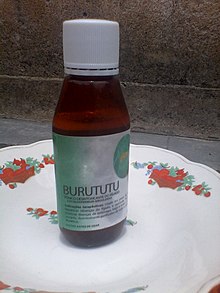Borotutu is traditional medicine made from the African tree Cochlospermum angolense. It is widespread in parts of Angola, where it is known as mburututu in the Chokwe and Kimbundu languages.[1]

Uses
editBorututu bark is claimed to have hepatic healing properties and a general cleansing effect. Borotutu bark pills and herbal teas are sold in health stores. The bark showed activity against the rodent malaria parasite Plasmodium berghei in laboratory tests.[2]
In Ghana, where the bark locally known as paajawu, it is added to Shea Butter during the boiling process for a vibrant yellow coloring.
References
edit- ^ Videira C, Pedro JM, Vaz Nery S, Rastreio etnobotânico nas comunas de Caxito, Mabubas e Úcua (Província do Bengo) – resultados preliminares, Instituto Politécnico de Lisboa, 2010. PDF
- ^ Presber W, Herrmann DK, Hegenscheid B (1991). "[The effect of an extract from Cochlospermum angolense ("Burututu") on Plasmodium berghei in the mouse malaria suppression test]". Angew Parasitol (in German). 32 (1): 7–9. PMID 2039095.
External links
edit- "The hepatoprotective cytochrome P-450 enzyme inhibitor isolated from the Nigerian medicinal plant Cochlospermum planchonii is a zinc salt". Journal of Ethnopharmacology. 48: 89–97. doi:10.1016/0378-8741(95)01290-t.